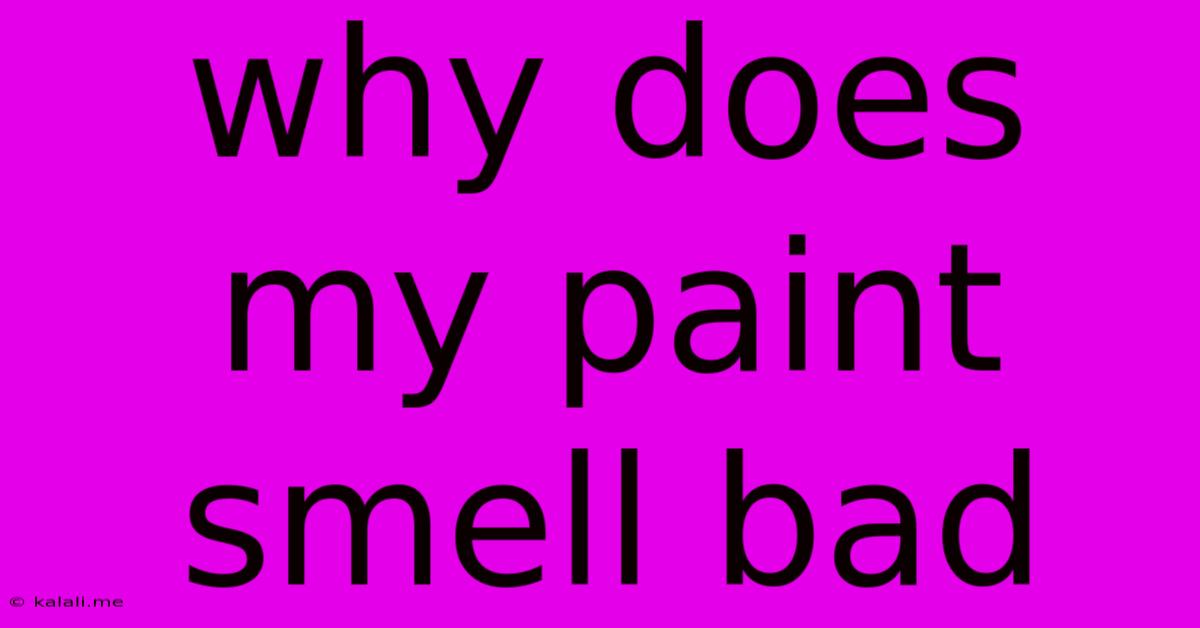Why Does My Paint Smell Bad
Kalali
Jun 01, 2025 · 3 min read

Table of Contents
Why Does My Paint Smell Bad? Understanding Paint Odors and How to Minimize Them
Meta Description: Unpleasant paint smells? This article explores the common causes of paint odor, from volatile organic compounds (VOCs) to specific paint types and storage issues. Learn how to minimize paint fumes and create a healthier painting environment.
Paint fumes. That pungent, sometimes headache-inducing smell that lingers long after you've finished your painting project. While a fresh coat of paint can transform a room, the accompanying smell is often less than desirable. But why does paint smell bad? Understanding the source of the odor is the first step to mitigating it.
The Culprit: Volatile Organic Compounds (VOCs)
The primary reason paint smells bad is due to the presence of volatile organic compounds (VOCs). These are chemicals that easily evaporate at room temperature, releasing gases into the air. Many VOCs are solvents used in paint to help it flow smoothly, dry quickly, and adhere properly. These solvents, including things like toluene, xylene, and formaldehyde, are responsible for that characteristic paint odor. The higher the VOC content, the stronger and longer-lasting the smell will be.
Types of Paint and Their Odors
Different types of paint have varying VOC levels and consequently, different odor profiles.
- Oil-based paints: Generally have a stronger and longer-lasting smell due to their higher VOC content. They often have a more pungent, oily odor.
- Latex paints: Typically have a lower VOC content than oil-based paints, resulting in a less intense and shorter-lasting smell. However, some latex paints still contain VOCs.
- Zero VOC and Low VOC paints: These paints are formulated with fewer or no VOCs, minimizing the odor significantly. They're a great option for those sensitive to strong smells or concerned about indoor air quality.
- Water-based paints: Often contain fewer VOCs than oil-based and some latex paints, but they may still have a slight smell.
Other Factors Contributing to Paint Odor
Beyond VOCs, several other factors can influence how strongly your paint smells:
- Proper ventilation: Inadequate ventilation traps paint fumes inside, intensifying the smell and potentially creating health concerns. Always ensure good airflow during and after painting. Open windows, use fans, and consider using an air purifier.
- Paint storage: Improperly stored paint can lead to a more pungent odor. Always keep paint tightly sealed in its original container in a cool, dry place.
- Paint age: Older paints can sometimes develop a stronger or different odor than fresh paint due to the breakdown of components over time.
- Paint type and color: Certain colors and types of paint may have a more noticeable odor than others. Darker colors sometimes have stronger odors.
- Undercoatings and primers: These products often have higher VOC content than the final paint coat and may contribute to a stronger smell.
Minimizing Paint Odor: Practical Tips
Here are some actionable steps to reduce paint odors in your home:
- Choose low-VOC or zero-VOC paints: This is the most effective way to reduce the intensity and duration of paint fumes.
- Ensure proper ventilation: Maximize airflow during and after painting.
- Use an air purifier: An air purifier with a HEPA filter can help remove paint fumes from the air.
- Open windows and doors: Increase airflow to naturally vent the fumes.
- Use fans: Exhaust fans or portable fans can help circulate air and remove odors more quickly.
- Activated charcoal: Placing bowls of activated charcoal around the room can help absorb some of the odor.
- Baking soda: Baking soda is also known to absorb odors – try placing open containers in affected areas.
- Vinegar: A bowl of vinegar can help neutralize some odors, but remember, it has its own distinct scent.
- Patience: Give the paint sufficient time to dry completely; the smell will diminish as the paint cures.
By understanding the causes of paint odor and implementing these strategies, you can create a more pleasant and healthier painting experience. Remember, prioritizing your health and well-being is paramount, so always choose paints and methods that minimize exposure to harmful chemicals.
Latest Posts
Latest Posts
-
How To Make Parentheses Bigger In Latex
Jun 04, 2025
-
Can You Use 3 Way Switch For 2 Way
Jun 04, 2025
-
How To Change Weapon Affinity Elden Ring
Jun 04, 2025
-
How To Fix A Door Frame My Dog Chewed On
Jun 04, 2025
-
Lack Of Evidence Is Not Evidence
Jun 04, 2025
Related Post
Thank you for visiting our website which covers about Why Does My Paint Smell Bad . We hope the information provided has been useful to you. Feel free to contact us if you have any questions or need further assistance. See you next time and don't miss to bookmark.